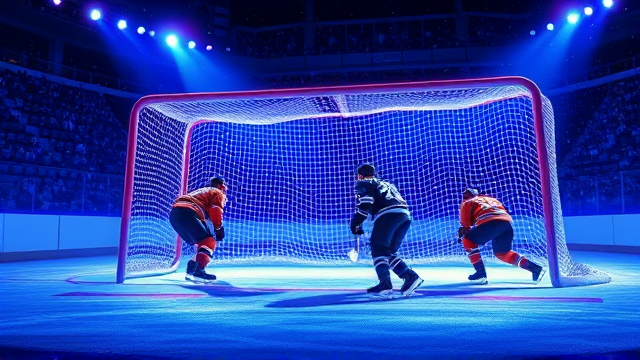KHL Admits Referee Error in SKA vs Avtomobilist Goal, Bans Official.
In a stunning admission of fallibility that has sent shockwaves through the hockey world, the Kontinental Hockey League has officially conceded a critical referee error that marred SKA Saint Petersburg's 2:1 victory over Avtomobilist Yekaterinburg, subsequently issuing a lifetime ban to the video review official responsible for the blunder. The controversy erupted at the 46-minute mark when SKA's Andrey Pedan unleashed a shot that, upon exhaustive review, never actually crossed the goal line but instead caromed off the exterior of the net—a fact the arena's video judge catastrophically failed to verify during the mandatory 60-second review pause before igniting the orange goal light that sealed Avtomobilist's fate.This wasn't merely a blown call; it was a systemic failure at the most fundamental level of officiating, a moment that calls to mind the infamous 'phantom goal' scenarios that have haunted football, like Frank Lampard's disallowed World Cup strike against Germany, moments that inevitably force leagues to confront their technological and human limitations. For Avtomobilist, this error snapped a formidable six-game winning streak under the legendary Igor Larionov, a coach whose own storied career was built on precision and grace, now witnessing his team's momentum derailed by a mistake so elementary it defies comprehension.The KHL's Department of Officiating, in an unusually swift and severe response, didn't just apologize to both clubs and their fanbases; it terminated a career, signaling a zero-tolerance approach to incompetence that could set a precedent for how professional leagues worldwide handle officiating integrity. One must ponder the psychological toll on the players—the euphoria of a hard-fought comeback for SKA now tainted by asterisks, the bitter injustice felt by Avtomobilist's roster who saw victory stolen by a puck that never went in, a scenario reminiscent of Diego Maradona's 'Hand of God' in its blatant inaccuracy, though absent the intentional deceit.This incident raises urgent questions about the KHL's review protocols: Are 60 seconds sufficient for such critical decisions? Is the technology adequate? Should there be a centralized review system akin to the NHL's Situation Room in Toronto to minimize local arena biases? Historical parallels abound, from the NFL's replacement referee debacle that culminated in the infamous 'Fail Mary' game to basketball's introduction of instant replay after countless disputed baskets, each case study proving that leagues only evolve when forced by controversy. The banned official's identity remains shielded, but his legacy is now permanently etched as a cautionary tale—a reminder that in modern sports, where high-definition cameras capture every angle, there's no hiding from the truth.For the KHL, a league constantly battling for credibility on the global hockey stage, this very public mea culpa is both damaging and refreshing; it damages the league's claim to elite officiating standards, yet refreshingly demonstrates a commitment to transparency that many older leagues still struggle with. The ramifications extend far beyond this single match: Will this trigger a wholesale overhaul of the KHL's video review infrastructure? Could it influence betting markets and league integrity protocols? And what of the standings—should there be a mechanism for point redistribution in cases of proven officiating fraud? As the hockey community digests this scandal, one thing is clear: the pursuit of perfect fairness in sports remains as elusive as ever, a game within the game where human error, even with technology's aid, continues to write the most dramatic storylines.
Latest News
The Washington Commanders' 25-24 collapse against the Chicago Bears on Monday Night Football wasn't just a loss; it was a masterclass in self-destruction, a
23 minutes ago0 comments
In the rain-soaked theater of FedExField, where narratives are forged in the crucible of pressure, Jake Moody authored a comeback story that transcends mere
33 minutes ago0 comments
In a stunning turn of events that has sent shockwaves through the Kontinental Hockey League, SKA's victory over Avtomobilist—a 2-1 result that snapped a
38 minutes ago0 comments
The fight capital of the world, Las Vegas, Nevada, will once again serve as the glittering stage for high-stakes combat as UFC 323 descends upon the T-Mobile
1 hour ago0 comments
The Chicago Bears didn't just exorcise a demon in their dramatic 25-24 victory over the Washington Commanders; they authored a redemption narrative worthy of
1 hour ago1 comments
The NFL coaching carousel has claimed its first major victim of the season, and it’s a stunner in Nashville, where the Tennessee Titans have sent head coach
2 hours ago1 comments
Alright, let's break this down like we're dissecting a last-second play in a Game 7.
2 hours ago1 comments
The gridiron of Northwest Stadium transformed into a canvas of pure, unadulterated football drama on October 13, 2026, as the Chicago Bears and Washington
2 hours ago0 comments
It’s quiet here...Start the conversation by leaving the first comment.
